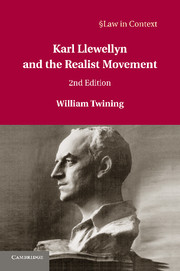Book contents
- Frontmatter
- Contents
- Foreword
- Preface
- Postscript
- Acknowledgements
- Abbreviations
- Part I The Rise of the Realist Movement 1870–1931
- Part II The Life and Work of Karl Llewellyn: A Case Study
- 6 The Man
- 7 Two Early Works
- 8 The Cheyenne Way
- 9 Law in Our Society
- 10 The Common Law Tradition
- 11 The Genesis of the Uniform Commercial Code
- 12 The Jurisprudence of the Uniform Commercial Code
- 13 Miscellaneous Writings
- 14 The Significance of Llewellyn: An Assessment
- Part III Conclusion
- Appendices
14 - The Significance of Llewellyn: An Assessment
from Part II - The Life and Work of Karl Llewellyn: A Case Study
Published online by Cambridge University Press: 05 December 2012
- Frontmatter
- Contents
- Foreword
- Preface
- Postscript
- Acknowledgements
- Abbreviations
- Part I The Rise of the Realist Movement 1870–1931
- Part II The Life and Work of Karl Llewellyn: A Case Study
- 6 The Man
- 7 Two Early Works
- 8 The Cheyenne Way
- 9 Law in Our Society
- 10 The Common Law Tradition
- 11 The Genesis of the Uniform Commercial Code
- 12 The Jurisprudence of the Uniform Commercial Code
- 13 Miscellaneous Writings
- 14 The Significance of Llewellyn: An Assessment
- Part III Conclusion
- Appendices
Summary
When Llewellyn first embarked on the study of law in 1915, the American law school world was at the beginning of a new phase. The broad pattern of its development for the next fifty years had already been anticipated in several important respects: Langdell's educational reforms had by then captured the leading law schools: Holmes and Pound had already charted the path for a more socially oriented approach to law; the revolt against formalism was well under way; and organizations such as the NCC had already begun their efforts to unify and modernize some branches of the private law of the various states; papers by Corbin, Hohfeld and Bingham had recently appeared, foreshadowing the growth of the Realist Movement and a rich, but confused period of juristic activity. The last years of Llewellyn's life and the period immediately after his death saw a series of events which suggested that the law school world was again entering a new era: for example, the implications of the computer were being explored; there was a marked increase of political and social consciousness in the law schools; there were signs of a corresponding decline in enthusiasm for the life of the law, and, perhaps, for the jealous mistress herself. The idea of love of the law, so eloquently expressed in The Bramble Bush and Holmes' speeches, seemed quaint to many law students of the sixties.
- Type
- Chapter
- Information
- Karl Llewellyn and the Realist Movement , pp. 366 - 372Publisher: Cambridge University PressPrint publication year: 2012



